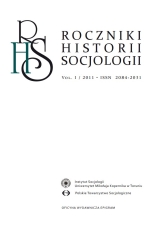Adam Schaff w roli „reformatora” polskiej socjologii
Abstract
Adam Schaff graduated from the University of Lviv in the field of law and economics. He obtained his doctorate and habilitation from philosophy at the Academy of Sciences of the former USSR. Therefore, he did not have a formal sociological education, which did not stop him from performing the function of a decision-maker both in removing sociology from universities and science institutions in the late 1940s, and reactivating them in 1956. The climax of this process was the organization of the First Congress of Polish Science in 1951. The first sacrifice of the change was no longer considering sociology as a separate science. Deep “reforms” were also carried out in disciplines considered crucial for the introduction of a new political order in Poland, that is, in philosophy, law and history. Tracing the situation that led Adam Schaff to the role of a decision maker both in philosophy and sociology is a little-known card in the history of Polish science. This was connected with the attempts to replace these sciences with the department of dialectical and historical materialism, which was imposed by government. These attempts ultimately turned out to be unsuccessful, as evidenced by the abandonment of these “reforms” in 1956 as well as the restoration of sociology and philosophy to the current scientific status. The very evaluation of Schaff ’s activity in this process is ambiguous, because in addition to the zealous implementation of party tasks, he was also able to protect the institutions of Polish science from total ideological dominance, as was the case in other socialist countries.
Full Text:
PDF
This work is licensed under a Creative Commons Attribution-NonCommercial 4.0 International License.
 Roczniki Historii Socjologii
Roczniki Historii Socjologii